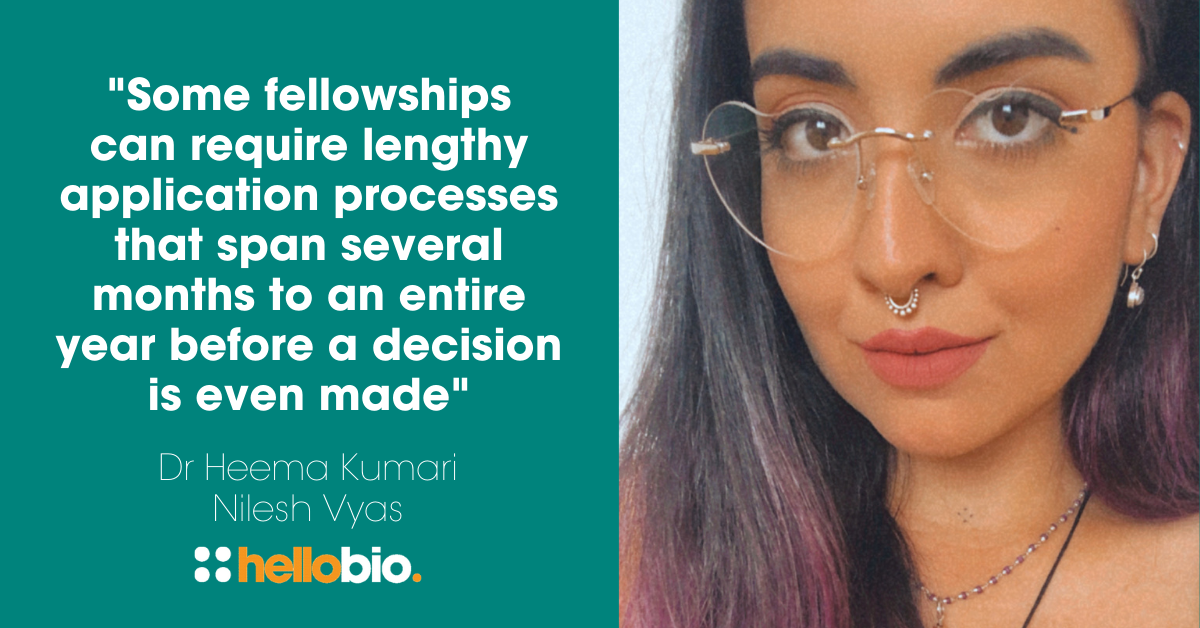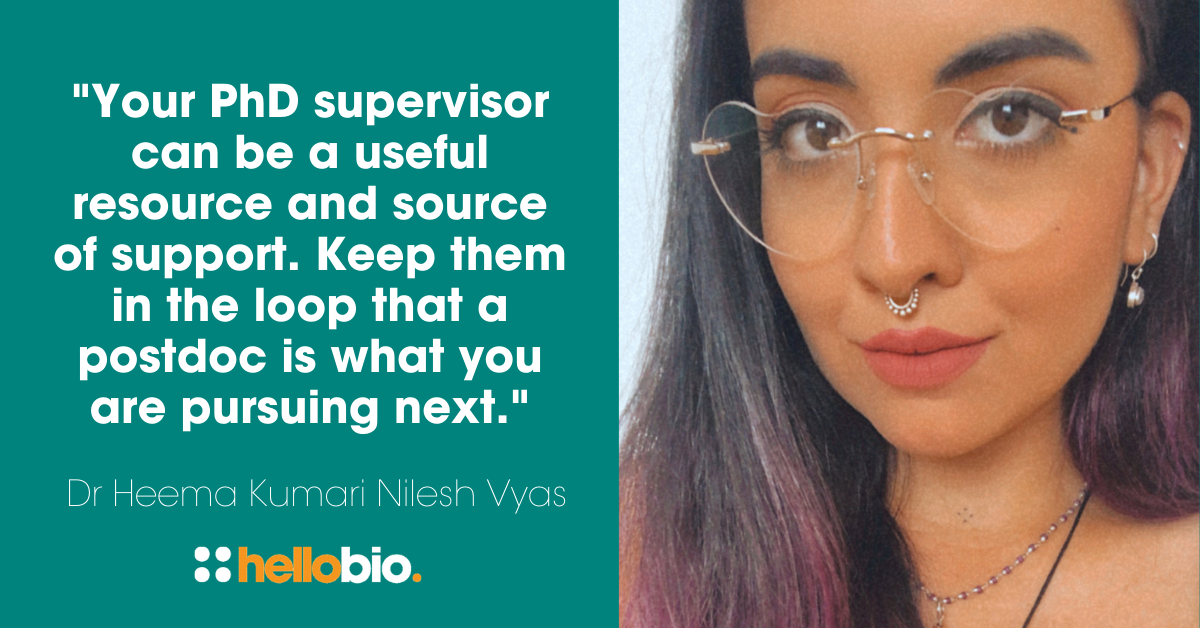Navigating the PhD to Postdoc Transition
Dr Heema Kumari Nilesh Vyas graduated with an Undergraduate Bachelor of Science (Medical Biotechnology) degree with a First-Class Honours in 2014 from the University of Wollongong (Wollongong, Australia). She then completed her PhD in December 2020 in the lab group of A/Prof Martina Sanderson-Smith, University of Wollongong (Wollongong, Australia). Her PhD project focussed on i) designing and optimising a Group A Streptococcus (GAS) host pharyngeal cell model, and ii) assessing the role of pharyngeal cell surface glycans in mediating GAS biofilm formation in the context of recurrent Strep pharyngitis and antibiotic treatment failure.
After her PhD, in May 2021, Heema began her postdoctoral position in the School of Chemical and Biomolecular Engineering at the University of Sydney (Sydney, Australia). As a postdoc, Heema is part of an interdisciplinary team led by Dr Anne Mai-Prochnow. The team is working on an ARC Discovery Project that explores cold atmospheric plasma and its effect on bacterial biofilms, their cells and extracellular matrix.
In this guest blog, Heema shares some valuable tips and points for consideration when managing the often confusing and hectic transition period towards the end of a PhD and through to securing your first academic research position as a postdoc.
---------------------------------------------------------------------
Wrapping up your PhD is an undeniably stressful time requiring a delicate balance between finishing up experiments, writing/finalising papers, preparing a thesis defence/exit seminar, all whilst carefully crafting and piecing together those hefty thesis chapters. On top of that, if you are decided upon pursuing a postdoctoral research position several questions will come to surface – WHEN do I start looking or applying for a postdoc? HOW do I even find these? WHERE do I want to apply (locally or abroad)? WILL I stay in my PhD field or switch? And the list of questions grows, as does the stress and anxiety…
These are my top 5 tips to consider when juggling and navigating the end of your PhD whilst also exploring postdoc options:
1) Start considering and deciding upon the path of pursuing a postdoc EARLY
I decided a postdoc was what I wanted to pursue 1.5 years prior to finishing my PhD. I also decided that I wanted an immediate start after completing my PhD.
On this basis, I would recommend starting this process early as it gives you ample time to consider your options: i) do you want to be a postdoc working on your own project off your own fellowship funding and/or ii) begin keeping an eye out on lab heads advertising projects they are funding in their lab.
This is especially important for the first option where you will need to design your own project for suitable postdoc fellowships. You will also need to identify a lab head whose expertise align to the proposed project, and is of course happy/able to have you as their postdoc. Another point to consider is that some fellowships can require lengthy application processes that span several months to an entire year before a decision is even made.
Overall, careful planning and consideration is needed as to when to start this process such that it aligns with a timely thesis submission/your post-PhD plans
2) Start contacting lab heads in advance
As aforementioned, if you decide to apply for a fellowship with a project in mind it is best to consider which labs research themes/lab heads' expertise align to what you wish to research. Once identified, arrange to have a chat with them and see if they have the capacity to support the project and you as their postdoc.
In general, it is best to enquire about any available postdoc positions in labs whose work you truly enjoy. Even if there isn’t funding at the time, if a good impression is left, the lab head may keep you in mind for future openings.
3) Discuss your intentions to pursue a postdoc with your PhD Supervisor
Your PhD supervisor can be a useful resource and source of support. They can assist you with your fellowship applications, interview prep, and suggest/keep an eye out for potential postdoc positions that may become available.
Moreover, it is important to keep them in the loop that a postdoc is what you are pursuing next. This enables them to be mindful, and ensure you are both on the same page regarding meeting thesis deadlines, so you are ready for a seamless transition into your new postdoc job!
4) Publish your papers ASAP
Many fellowships ask about your publications.
Having papers published, or at the very least submitted prior to or whilst you apply for fellowships and/or advertised postdoc positions is important. Moreover, first-author papers further embolden and strengthen your position as a candidate for the fellowships/postdoc positions you are applying for.
5) Build your profile as a candidate to ensure you stand out
Your CV is more than just your qualifications, academic awards, papers, and PhD lab experience.
Whether you are applying for a Fellowship or an advertised postdoc position, they are almost always looking for well-rounded researchers.
Consider:
- Joining/leading committees (e.g., University Student Counsels or Committees, Committees within your research field, Equity/Diversity/Inclusivity Committees)
- Engage in SciComm (utilising social media platforms, SciComm events, writing blog pieces, producing podcasts, giving interviews on your work)
- Be involved in organising conferences, symposiums, events
- Listing your hobbies outside of academia can also count!
Connect
If you have any further questions or queries, find me on Twitter @HKNVee where I am always open for a chat!
_________________________________________________
If you enjoyed this article, why not check out the other resources available on our blog. We are passionate about supporting life scientists, early career life scientists and PhD students - with really low- priced reagents and biochemicals, early career scientist grants, and resources to help with both personal and professional development. We know how tough it is - so we hope you find these helpful!
Advice & guidance for life scientists
Click below to view our essential guides and articles to support life scientists, PhD students & early career life scientists:
Wellbeing for scientists
Click below for our resources to help improve your wellbeing:
Technical resources
Try our Molarity Calculator: a quick and easy way to calculate the mass, volume or concentration required for making a solution.
Try our Dilution Calculator: an easy way to work out how to dilute stock solutions of known concentrations
And - when you get to the stage of planning your experiments, don't forget that we offer a range of agonists, antagonists, inhibitors, activators, antibodies and fluorescent tools at up to half the price of other suppliers - click below to see how we compare with other suppliers:





















